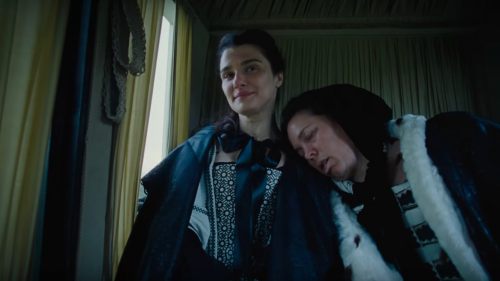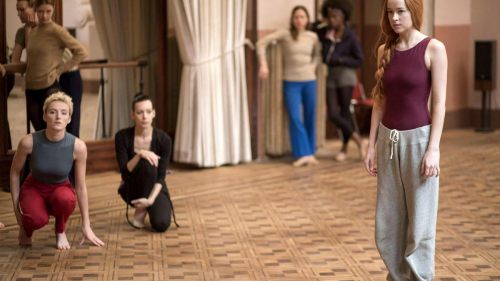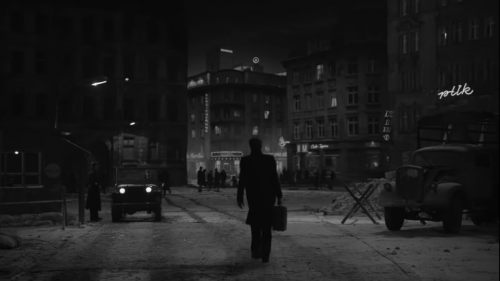MEAN GIRLS, THE FAVOURITE And The Evolution Of Female Power
The Favourite is out soon. Get your tickets here!
“There is a special place in Hell for women who don’t help other women.”
This Madeleine Albright quote has been repeated to the point of cliche, but that’s only because the sentiment behind it still rings true. In a world where men still hold most of the power, the few women who manage to gain positions of influence should do everything they can to pull their sisters up behind them.
The key word here is “should.” From an idealistic standpoint, this makes sense. But the opposite side of the coin is that when power is scarce, the baser instinct is not to share it, but to hold onto it with all your might. Since female power in a male dominated society (one that has also defined our concepts of success) is so hard to come by, it follows that women have, both historically and today, often been forced to employ cutthroat tactics to get and retain influence - and, by extension, agency.
This is certainly the mindset at the heart of The Favourite, Yorgos Lanthimos’ absurdist take on the historical relationship between Queen Anne (Olivia Colman), her close friend and advisor Sarah Churchill (Rachel Weisz) and Abigail Hill (Emma Stone), a disgraced noblewoman-turned-servant. Anne was born into power. Sarah has gained it, and clings fiercely to what she’s earned. Abigail seeks to regain the power she’s lost. The film shows the three women engaged in a poison-barbed battle of wits and royal favor, while the men around them never have to work that hard to get ahead.
But the concept of women forced by a patriarchal society to tear each other down on their way to the top isn’t limited to 18th century Britain. The girl-on-girl crime practiced by 21st century high schoolers defines what may be The Favourites' closest thematic relative, Mean Girls. Tina Fey and Mark Waters’ 2004 comedy gets at some of the same ideas The Favourite does, particularly in its presentation of female relationships and roles.
In Mean Girls, homeschooled Cady Heron (Lindsay Lohan) is starting her first year of public high school. Having grown up in Africa with her zoologist parents, the social strata of high school is completely new to her. This makes her a perfect target for Regina George (Rachel McAdams), North Shore High School’s villainous reigning queen bee and leader of popular girl clique The Plastics. Initially urged by her Plastics-hating friends Janice and Damien to infiltrate the group, Cady ends up getting in too deep, de-throning Regina and provoking her apocalyptic ire.
As a well-intentioned outsider, Cady is barely aware of the pain she’s causing others as she rises to the top of the high school social ladder. She also seems unaware of how much of the behavior she witnesses, and later exhibits, is directed by a society that, like the one depicted in The Favourite, has very narrow views of what girls are allowed to be.
Girls are not, for example, supposed to like the way they look. In an early scene, Regina compliments Cady’s appearance to bait her into expressing self-esteem, then immediately calls her out on it. Later, Regina and her minions, Karen (Amanda Seyfried) and Gretchen (Lacey Chabert) complain about their non-existent physical flaws - their calves, their hips, their “man shoulders” - as Cady looks on.
Girls are also not supposed to be smarter than boys. Cady is naturally gifted at math, but is forced to hide her skills. She can’t join Mathletes because it’s “social suicide.” She fears looking too intelligent in front of her big crush, Aaron Samuels, so much so that Cady intentionally attempts to fail math so she can get him to “tutor” her.
Female relationships in Mean Girls are also defined by adherence to a strict hierarchy that not only rings true for the high school experience, but also reinforces the idea that there’s only room for one woman at the top. Regina, Karen and Gretchen’s relationship to each other follows arbitrary rules created by Regina to establish her own dominance (on Wednesdays they wear pink). It’s no coincidence that Regina’s name refers to a royal title. Nobody else is allowed to be on her level, unless they overthrow her.
With some guidance, Cady, Regina and the rest of the North Shore High kids are able to take a self-aware step back before they go completely over the edge. They have the modern luxury of learning to be comfortable in their own skins, and not having to worry about their social status. In The Favourite, however, no such option exists. Social status is akin to power, and power equals freedom.
Placing the two films side-by-side, some fascinating similarities become apparent when looking at the ways The Favourites' female characters use each other to get what they want. Stone’s Abigail, for example, could be seen as an early historical version of Lohan’s Cady. The biggest difference between them is that Cady only slowly recognizes her devious nature, while Abigail actively uses hers as a tool.
Together, The Favourite and Mean Girls present a kind of timeline of female relationship to power. The scary thing is that between the two eras portrayed, not that much has changed. Success for women is still narrowly defined, and competition for limited space in the pecking order is still encouraged. However, by the time we get to Mean Girls, there’s an added option to reject the system entirely. It’s a small glimmer of hope that suggests the power dynamic is starting to change, and with it, the stories we tell.



